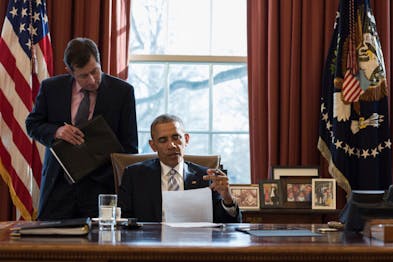Terry Szuplat, an American University alumnus and former White House speechwriter under former President Barack Obama, shared advice on the importance of personal speeches, listening to different perspectives and how his time at the University impacted his career in his first book, “Say It Well.”
Szuplat’s book blends advice on public speaking, personal experiences about becoming a better speaker and advice he received from Obama.
“We all have insecurities. We all have self-doubt,” Szuplat said. “But one of the things that I try to convey in the book is that oftentimes, the most memorable speeches are personal speeches.”
Szuplat, an adjunct professorial lecturer in the School of Public Affairs, has worked in the speechwriting field for nearly 30 years. He was a staff member for the Commission on Protecting and Reducing Government Secrecy from 1995 to 1997, which was chaired by Senator Daniel Patrick Moynihan. From 1998 to 2001, he worked as the director of speechwriting for Secretary of Defense William Cohen and was awarded the Secretary of Defense Medal for Outstanding Public Service.
Szuplat was then a freelance consultant for seven years and served on the speechwriting team at the 2004 and 2008 Democratic National Conventions. Szuplat was Obama’s speechwriter for both of his presidential terms and wrote nearly 500 speeches. He then took his expertise to American University, where he taught political speechwriting for two semesters.
“If you’re a student getting up to speak, you don’t have to sound like the president of the university,” Szuplat said in an interview with The Eagle. “You have a perspective and experience, all your own, share that.”

During his book tour, Szuplat traveled to areas such as New York City, Boston, Atlanta and Los Angeles to meet with his readers and address the topics in his book.
“I’ve had a number of people come up to me and said, ‘You know, I just never felt like I’ve had a voice and this book shows me how to reclaim my voice,’” Szuplat said. “It means a lot to me, just because that’s why I wrote it.”
Szuplat credits Obama for teaching him the importance of communicating with others because of political polarization. In his book, he explored solutions such as listening and acknowledging other perspectives as a way to “bring back some civility.”
“Great speaking starts with listening,” Szuplat said. “The way we talk about politics and the way we talk about policy in this country, it’s not working.”
When Szuplat went to work for Obama, he already had the basic fundamentals, but said that every day was a learning experience. He started his day at 7 a.m., wrote speeches “on global security, international economics, U.S. foreign and defense policy, entrepreneurship, [and] development and human rights,” according to his website, and finished at around 7 p.m.
Szuplat visited more than 40 countries with Obama. During Obama’s second term as president, Szuplat helped write the State of the Union addresses.
Szuplat said Obama, who would sit down with Szuplat and make edits on his speeches as he was writing, “cared deeply about the words he used.”

“He might even break out the yellow legal pad at night, rewrite the speech himself,” Szuplat said.
Szuplat also acknowledged Obama as “a remarkable boss.”
“If anyone could be forgiven for losing their patience once in a while, it would be the president of the United States, but he never did,” Szuplat said. “If he could stay calm, cool and collected despite all the pressures he was under, then none of us have an excuse to be mistreating our subordinates.”
The most challenging speeches he had to write were for tragedies, such as disasters, terrorist attacks or mass shootings.
“We just knew that no matter what we wrote, it wouldn’t be equal to the pain,” Szuplat said. “What we found ourselves doing is, as best we could, try to let them know that they weren’t alone.”
Szuplat acknowledged that speechwriting has changed over time and provided tips for those interested in pursuing it. He focused on the importance of brevity due to social media and taking advantage of YouTube to listen to speeches. He also rejected using “a bot when you want to forge a human connection with your audience.”
Szuplat returned to American University and currently teaches a political speechwriting course. During his time as an American University student, Szuplat had three internships, including in a senator’s office, in the British Parliament and as a White House speechwriter. He graduated in 1995.
“I just wanted to be in D.C.,” Szuplat said. “I wanted to soak up everything that the city had to offer.”
Szuplat also organized a weekly open mic night where students debated key issues. One of the biggest turnouts was when the prompt was “Should Greek life be banned from the University?”
Looking back at his college experience, Szuplat said that students nowadays are more plugged into the world and more open about mental health. His advice to the current generation is to listen to different opinions but to also vocalize your opinions as well.
“Remember that your voice is the most powerful thing you have in the world,” Szuplat said. “Don’t silence yourself.”
This article was edited by Samantha Skolnick, Tyler Davis and Abigail Turner. Copy editing done by Luna Jinks, Sabine Kanter-Huchting, Ariana Kavoossi and Ella Rousseau.





